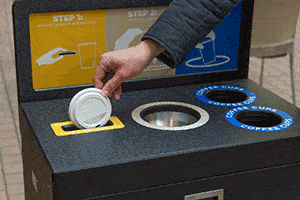
Return-It
Burnaby, British Columbia-based Encorp Pacific (Canada), doing business as Return-It, and Metro Vancouver are working alongside Tim Hortons and A&W Canada to pilot British Columbia’s first initiative to recycle coffee cups in commercial and public buildings.
Return-It, an industry owned, nonprofit product stewardship agency with beverage container management as its core business, is managing the pilot.
Currently, coffee cups are collected and recycled through the province’s residential recycling program. However, more than half of hot and cold coffee cups that are disposed of as garbage in Vancouver, British Columbia, come from industrial, commercial and institutional (IC&I) sources. The pilot program’s goal is to measure and identify a recycling solution that diverts this material from the landfill.
The six-month pilot program, which began Feb. 3, will evaluate a new collection network at commercial and public buildings in five downtown Vancouver locations, with customized bins designed to determine the most effective signage and configuration. The public is encouraged to place their used coffee cups in the bins provided. Coffee cups, lids and sleeves collected during the pilot will be used to test and develop new recycling solutions, according to a news release issued by Return-It.

The pilot will evaluate recycling end markets for the items collected, test the marketability of different disposable coffee cup materials (such as laminated cups), encourage public participation and determine the viability of a broader, permanent program, Return-It says.
Recycling Alternative, a Vancouver-based IC&I recycling company, will support pilot operations, and the city of Vancouver is supporting the program by providing building access and maintenance staff. Once the pilot wraps up, results and learnings will be gathered to develop the next steps, according to Return-It.
“The world’s attention is increasingly focused on the need to reduce waste, and the same goes for [British Columbia],” said Allen Langdon, president and CEO of Return-It. “Our province has always been at the forefront in recycling and diverting waste from landfill within Canada, so pioneering this program in Vancouver represents a natural progression in our leadership role.”
This initiative reflects public demand for convenient recycling options in the food and beverage sector, Return-It says. The vast majority—83 percent—of Vancouver residents believe the food service industry should provide recycling options for their single-use cups, according to local polling firm Research Co. This pilot aims to take the first steps to develop and address the large number of cups coming from the IC&I sector.
“Achieving less waste by improving recycling systems reflects the public’s expectations of strong environmental stewardship in the region,” says Sav Dhaliwal, chair of Metro Vancouver. “By addressing the recyclability of these common items, this pilot is an important first step towards zero waste and the transition to waste prevention and the circular economy.”
“At Tim Hortons, we believe that we have a responsibility to contribute to a clean environment,” says Mike Hancock, chief operating officer, Tim Hortons. “Since 1978, we’ve been encouraging our guests to bring reusable mugs by offering a 10-cent discount, something that we continue to do to this day. This year, we’ll be leveraging our biggest consumer promotions to encourage even more guests to bring reusable mugs. Nationally, we have also rolled out strawless lids that will remove 120 million straws and wooden stir sticks that will remove 186 million plastic stir sticks from our restaurants each year. This pilot will give us the opportunity to evaluate a publicly accessible hot coffee cup recycling program—we are looking forward to seeing the results.”
“We are excited to be part of this important pilot program,” says Tom Newitt, vice president of marketing at A&W Canada. “Over the years, we’ve made many changes to reduce the environmental impact of our packaging. With reusable mugs, ceramic dishes and cutlery in our restaurants, we’re able to keep over 100 million pieces of single-use packaging out of Canadian landfills each year and most of the take-out packaging we use is either recyclable or compostable; but only where facilities exist. If there’s a way to ensure that all single-use coffee cups in Canada are getting recycled or composted, we want to be part of it.”
Bin locations are available at www.Return-It.ca.
Get curated news on YOUR industry.
Enter your email to receive our newsletters.
Latest from Recycling Today
- Buy Scrap Software to showcase its software at Scrap Expo in September
- LG details recycling activities
- Algoma EAF is up and running
- Toyota-Tsusho completes acquisition of Radius Recycling
- CATL, Ellen MacArthur Foundation aim to accelerate circular battery economy
- Commentary: Expanded polystyrene is 98 percent air, 2 percent plastic and 100 percent misunderstood
- AMCS appoints general manager for North America
- How tariffs, regulations affect LIBs recycling in US, EU






